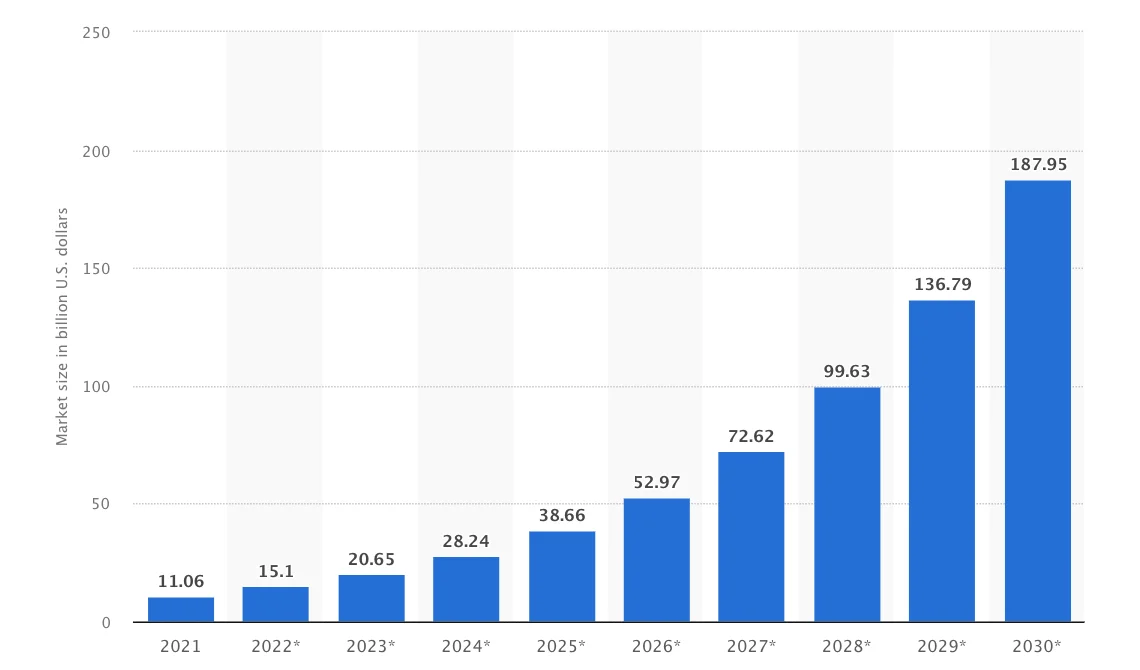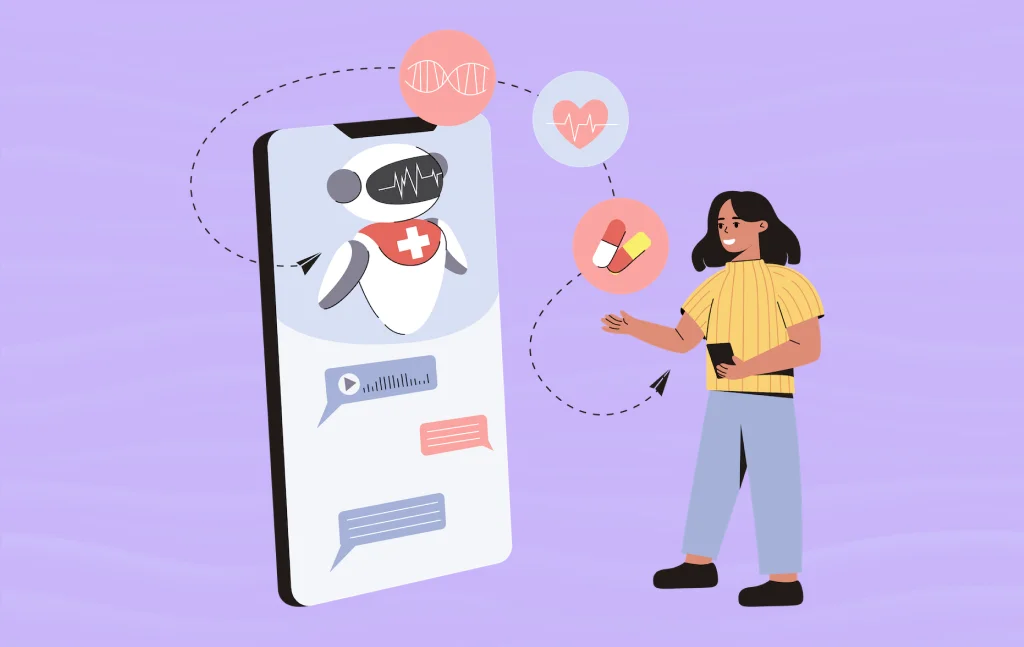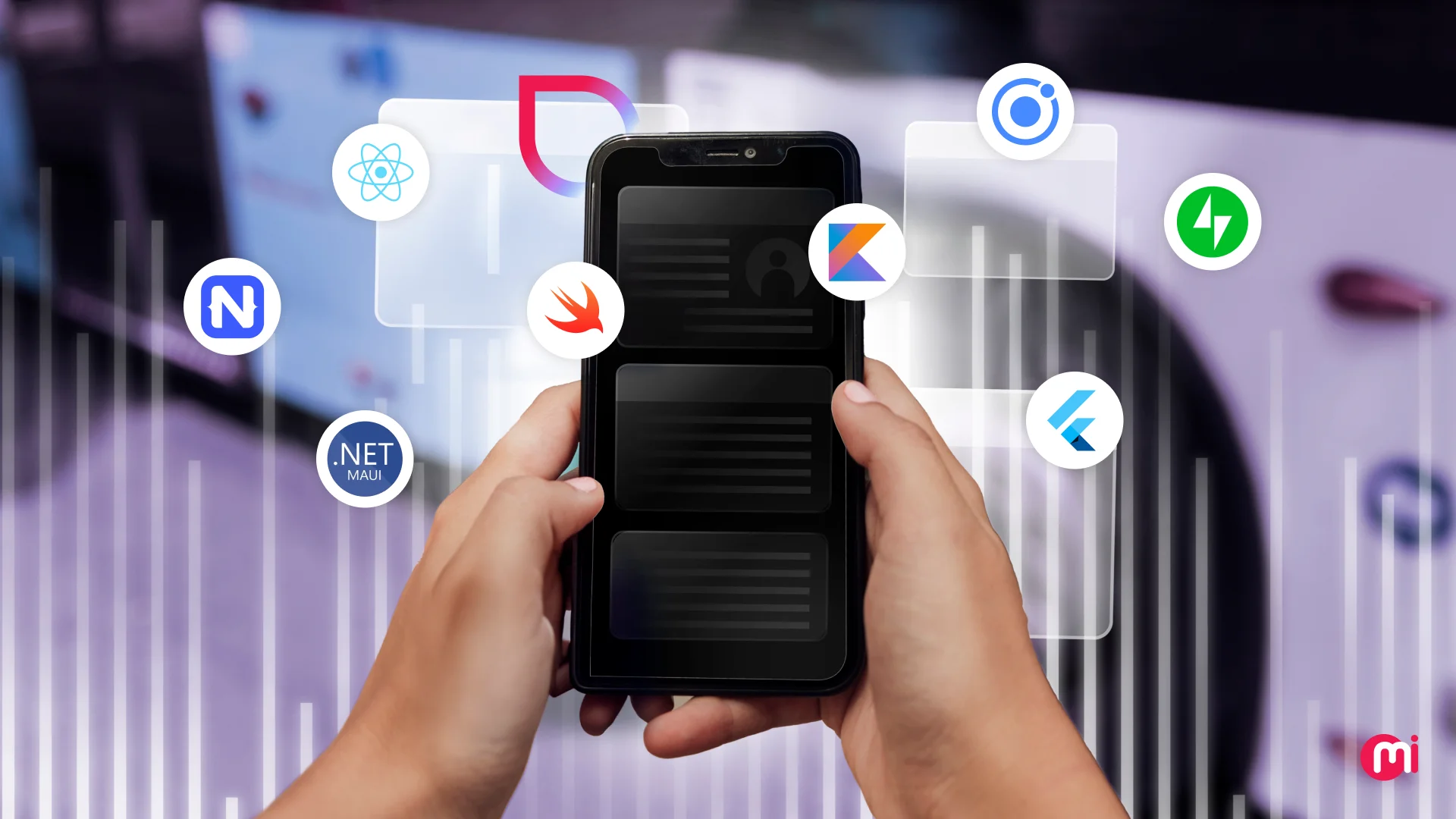Enhancing Healthcare Services with AI Chatbots
- Mobile
- March 3, 2023
Artificial Intelligence is undoubtedly impacting the healthcare industry as the utilization of chatbots has become popular recently. Organizations are reaping benefits of these AI-enabled virtual agents for automating their routine procedures and provide clients the 24×7 attention in areas like payments, client service, and marketing.
As per Statista’s report, the global AI health market size was $15.1 billion in 2022, and it is expected to reach around $187.95 billion by 2030, increasing at a CAGR of 37% from 2022 to 2030. Currently, chatbots are prepared to make a mark on the healthcare industry.

Medical providers are already utilizing different kinds of AI, such as machine learning or predictive analysis for identifying different problems. And nowadays, a growing number of them are seeking chatbots.
A survey done by Crunchbase says that over $800 million has been spent across almost 14 recognized startups building a health chatbot service.
AI has come as a savior in the healthcare industry. From detecting diseases to using life-saving machines, AI is making strong new scopes across the industry. However, we still cannot say that doctors’ appointments could be replaced by devices.
To know in detail about the rise of chatbots in healthcare, its benefits, risks, use cases, and more, you must read this blog!
What are the AI Chatbots in Healthcare?
In the medical background, AI-enabled chatbots are utilized for prioritizing patients and guiding them in getting relevant assistance. Chatbots are more trustworthy and precise substitutes for online search that patients carry out when they want to know the reason for their symptoms.
According to medical service providers, chatbots might assist patients who are unsure of where they must go to get medical care. Numerous people are unaware of when their conditions need a visit to the doctor and when it is a must to contact a doctor through telemedicine.
Common people are not medically trained for understanding the extremity of their diseases. This is where chatbots can be a great help. They gather prime data from patients and depending on the input, they give more data to patients regarding their conditions and recommend further steps also.
How Do Chatbots Perform?
Chatbots utilize NLP (Natural Language Processing). The same technology is utilized for enabling the voice recognition systems of Apple’s Siri and Microsoft’s Cortana to speech, text, parse, or understand efficiently. They imitate human conversation through a user-friendly interface, either via a web app or a standalone application.
Progress in the precision of NLP implies that now chatbots are enough advanced to be combined with machine learning and utilized in a healthcare setting.
Read also: How Chatbots Taking Position of Mobile Apps
Types of Chatbots in Healthcare
To build a chatbot that involves and offers solutions to users, developers should decide what kind of chatbots would most efficiently accomplish these targets. Hence, 2 things they should ponder are the users’ purpose and the best help they require. Then only developers can build the right chatbot.
Primarily 3 basic types of chatbots are developed in healthcare – Prescriptive, Conversational, and Informative. These three vary in the type of solutions they offer, the depth of communication, and their conversational style.
1. Prescriptive Chatbots
Albeit prescriptive chatbots are conversational by design, they are developed not only for offering direction or answers but also for providing therapeutic solutions.
2. Conversational Chatbots
Conversational chatbots are developed for being contextual tools that offer responses depending on the users’ purpose. Nevertheless, there are various maturity levels to a conversational chatbot – not all of them provide a similar intensity of the conversation.
Conversational chatbots with higher levels of intelligence can offer over pre-built answers and understand the context better. This is because these chatbots consider a conversation as a whole instead of processing sentences in privacy. If a chatbot has a higher intelligence level, you can anticipate more personal responses.
This is when conversations begin mimicking human interactions. Conversational chatbots utilize NLU (Natural Language Understanding), NLP (Natural Language Processing), and apps of AI that power devices for understanding human intent and language.
3. Informative Chatbots
Informative chatbots offer useful data for users, sometimes in the form of breaking stories, notifications, and pop-ups. Usually, these bots offer automated client support and data. Mental health websites and health news sites also utilize chatbots for helping them access more detailed data regarding a topic.
Chatbot developers must use different chatbots for involving and offering value to their audience. You need to know your audience and what suits them most and which chatbot works for what setting. Every chatbot you create that targets to offer healthcare suggestions must intensely ponder the rules that regulate it.
There are things you can or can’t say and there are guidelines on the way you can say things. Operating yourself through this environment will need legal advice to instruct as you develop this part of your chatbot.
Use Cases of Chatbots in Healthcare
Since Artificial Intelligence in healthcare is still a new innovation, these tools cannot be completely responsible when it comes to patients’ engagement beyond client service and other fundamental jobs. Nevertheless, there are still some amazing use cases that AI in healthcare can help.
Here are some use cases of chatbots that highlight the potential advantages they offer to patients, medical service providers, and doctors when integrated with various types of healthcare software:
1. Client Service or Administration
Log in to nearly every website these days and there is a chatbot waiting for helping you in website navigation of solving a minor issue. Hence, chatbots will continue to help users navigate services about their healthcare. In this regard, chatbots may be in the future will issue reminders, schedule appointments, or help refill prescription medicines.
There will be some HIPAA and privacy difficulties for jumping before tech like that becomes a usual place. Undoubtedly these types of client and administrative service functions are simply on the horizon.
2. Health Tracking
Patients who need healthcare support regularly can get advantages from chatbots also. For instance, medical providers can utilize bots for making a connection between patients and doctors.
Such bots can offer detailed health conditions’ track record and help analyze the impacts of the prescribed management medicine.
3. Mental Health
Different bots provide users a humanized experience to make users feel that they are talking to a real individual. For numerous individuals, only being capable of talking regarding how they feel and the anxiety they may be having is highly useful in creating better mental health.
For patients like this, they can utilize a conversational health bot as an outlet for discussing their feelings. In case their requirements go beyond the bot’s capacities, a healthcare expert can simply take over and step in while being capable of referencing the interactions between the chatbot and the patient.
4. Employing and Training
Large healthcare agencies are continuously employing and onboarding new employees. For processing these applications, they generally end up producing lots of paperwork that should be filled out and credentials that should be double-checked. The task of HR departments will become simpler by connecting chatbots to these facilities.
For instance, new hires could subscribe to the chatbots and become integrated into the onboarding procedure for a new employee or receive data regarding the organization.
A company can utilize chatbots for sending files to new employees whenever required, reminding new employees automatically for finishing their forms, and automating several other jobs like requests for maternity leave, vacation time, and more.
5. Patient Involvement
Chatbots are made to not only capture actively but also grab patients’ interest in their care calls into queries in case the technology can further involve patients for enhancing results.
Despite the healthy analysis circulating the problem, the right technology will make that bond between the patient and provider stronger, not break it.
Sometimes doctors direct patients to journal and then return a week later. But, tech-savvy people won’t wait for something to be discussed in a week.
Nevertheless, if you can make it simpler by offering them something handy, relatable, and fun, people will do it. Patients have lots of healthcare expectations in this on-demand world. Hence, healthcare providers should accept always-on accessibility powered by AI.
6. Research or Treatment
Harnessing the strength of data is another scope – especially machine learning – to assess data and studies quicker than ever. With the continuous outflow of new cancer research, it’s difficult to keep records of the experimental resolutions.
Although a doctor doesn’t have the bandwidth for reading and staying ahead of each new piece of research, a device can. An AI-enabled device can search through all the information and offer solid suggestions for patients and doctors.
Maybe this use case is more regarding the progress to arrive from machine learning, but that data’s extraction may and could very properly be in automated types of support and outreach. Rather, it is possible to suspect that there will be a connection between the automatic discovery of pertinent data and delivering it, everything with an object of providing more customized treatment.
7. FAQs (Frequently Asked Questions)
The FAQ segment is one of the most commonplace elements in sites. Now several providers change this segment into an interactive chatbot feature on their homepage dedicated to answering basic queries. Hospitals and clinics do this for making data discovery easier for users.
For instance, chatbots can answer queries like what the payment tariffs are, which documents are important to get treatment, what the business hours are, and how much the insurance covers.
This is how a chatbot functions like the one-stop-shop for responding to all basic inquiries in seconds. Patients don’t require calling the clinic or spending time on the site navigation for finding the data they require.
8. Billing and Claims
Nobody wants to handle medical bills, insurance agencies, and claims. Luckily, healthcare AI bots can help with these jobs. Health bots can check present coverage, help file claims, and track those claims’ status. Moreover, these bots can help doctors in the billing inquiries and the pre-authorization procedure.
Top Benefits of AI Chatbots in Transforming Healthcare
AI-enabled chatbots provide a bunch of advantages to healthcare practices. Some of the best advantages incorporate:
1. Chatbots Enhance Patient Access
Patients are not restricted to office hours. They can receive the data they require at every time of day or night.
2. Chatbots Automate Data Deployment
Data that is enabled for being distributed through bots can be sent as required, any time. Moreover, the transaction can be smoothly handed over to a human whenever required.
3. Chatbots Save You Money
Healthcare chatbots are able to manage a wide range of healthcare inquiries, including appointment booking and medication assistance. Chatbots can help healthcare businesses save a lot of money.
4. Chatbots Are Scalable
When a human employee receives lots of requests, you have to hire more people. But chatbots alone can deal with one interaction or 1000 interactions with no problem.
5. Chatbots Serve Fewer Missed Appointments
One missed appointment costs a medical provider on average $200. Chatbots’ reminder messages can make it far less possible that patients will forget to attend.
6. Chatbots Offer Quick Data
Chatbots not only deal with patient interactions but also help with internal record-keeping. Many institutions have AI that gets essential data and notifies healthcare experts when required.
7. Chatbots Can Involve in Lead Creation
By meeting promising patients in the channels they are most inclined to use, chatbots can boost brand awareness and showcase patients the brand value.
Key Risks and Challenges of Chatbots in Healthcare
Although the possible advantages are many, digital entrepreneurs and healthcare leaders should be aware of some challenges to make sure the best possible results for healthcare agencies and clients.
1. Wrong Provision of Medical Data
A considerable risk presents around the probability of danger being caused by the wrong provision of medical data. Chatbots may not know every appropriate factor related to the patient or could make a wrong diagnosis, and the financial significance of an error can be massive.
2. The Lack of Face-to-Face Interaction
This also could be a problem. Many people are more acquainted with face-to-face interactions. And chatbots may not have the capacity of completely understanding the emotions of patients. Hence, they could underestimate the basic extend of a patient’s requirements.
And on the other hand, some patients may face trouble using new technology as an outcome of the inadequacy of human contact, which may leave them feeling detached from their HCP.
3. User Privacy Vulnerabilities
This is one of the key concerns when it comes to using AI chatbots in healthcare. While using such software products, users might be afraid of sharing their data with bots. Business owners who establish healthcare do their best to execute data security measures for making sure their platforms resist cyber-attacks.
When there is an online interface, there is a possibility of hacking. And user privacy is a vital problem when it comes to any kind of AI application and sharing data regarding a patient’s medical condition with a chatbot appears less trustworthy than sharing the same data with a human.
By being aware of these possible risks, medical experts and patients can reap the maximum benefits of this technology. By understanding the needs and detecting any issue, medical experts will become better at distributing this technology and getting the types of results they are seeking.
How Much Does It Cost to Develop an AI Chatbot?
Developing a chatbot from the beginning may cost you from $30000 to $50000. As is the case with all sort of custom mobile app development services, the ultimate expense will depend on how advanced your chatbot app ends up being. For example, executing an AI engine with ML algorithms will increase the price for development.
You should also ponder whether your healthcare chatbot will be integrated with current software apps and systems like the telemedicine platform, EHR, etc. We suggest using readymade SDKs, APIs, and libraries for keeping the budget for chatbot building under control. This practice reduces the cost of the app development, but it also accelerates the time for the market considerably.

Looking To the Future of Chatbots in Healthcare
We will see more detailed chatbot solutions grow on the market in the future. The most innovative chatbots will integrate many features.
For instance, chatbots will help users check their symptoms and depending on the diagnosis, schedule an appointment, answer to the queries, and provide direct telemedicine consultation with a doctor through video calls. The doctor will prescribe medicines after this consultation and the system will store the prescription.
There is lots of room for enhancement in the healthcare industry when it comes to AI and other tech solutions. The rates of cloud adoption are on a higher level and a growing number of healthcare providers are seeking new ways for organizing their procedures and lessening wait times.
Chatbots’ role is always acceptable to be in improving the job of healthcare experts, instead of replacing them. Hence, the advantages of using chatbots in healthcare are uncountable. They can eliminate costs dramatically and boost efficiency, reduce the pressure on healthcare professionals, and enhance patient results.
Albeit the present challenges around precision and inadequacy of human contact imply that chatbots are the best suited to non-urgent medical requirements and routine jobs, enhancements in machine learning and NLP in the future may yet to find chatbots utilized in more complicated apps.
Last but not least, apart from being one of the essential features, healthcare software must also include additional features to enhance its functionality, such as predictive analytics, qualitative imaging analysis, and more. To explore these features and learn more about healthcare software, check out our Healthcare Software Development Guide.
FAQs About Chatbots in Healthcare
There are some well-known chatbots in healthcare like Babylon Health, Ada Health, YourMd, Buoy Health, CancerChatbot, Safedrugbot, Safedrugbot, etc.
A chatbot helps in providing accurate information about COVID-19 in different languages. And, AI-driven chatbots help to make the screening process fast and efficient.
The cost to develop healthcare chatbot depends on factors like platform, structure, complexity of the design, features, and advanced technology. Please send your chatbot requirements to know the exact cost.













